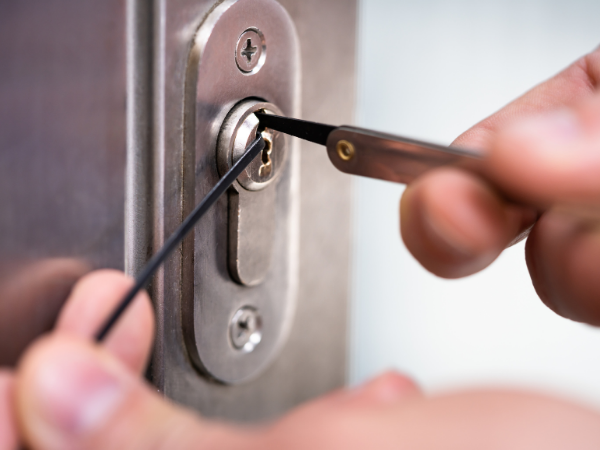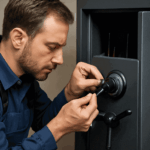Are you considering the locksmith profession as your career? Do you want to learn how to become a locksmith in PA? If you reside in Pennsylvania, including cities like Philadelphia, Pittsburgh, Allentown, Erie, Reading, Scranton, Bethlehem, Lancaster, Harrisburg, and York, this guide will help you navigate the path to becoming a locksmith.
You may also like: How to Become a Locksmith in Arizona?
In this guide, you’ll discover:
- How to get locksmith training in Pennsylvania
- Finding locksmith schools in Pennsylvania
- Steps on how to become a locksmith in PA
- How to start your locksmith business in Pennsylvania
Should You Become a Locksmith in Pennsylvania?
Locksmiths play a critical role in creating, repairing, and installing locks for homes, businesses, and vehicles. From lost keys to lock upgrades, their services are essential for security.
In Pennsylvania, most locksmiths are self-employed or operate family-owned businesses. Starting your own locksmith business requires minimal investment and can even begin with a mobile van setup. Essential tools like key-cutting machines and automotive key programming equipment are necessary to get started.
Pennsylvania does not regulate the locksmith trade, meaning no specific locksmith license is required. This allows aspiring locksmiths to gain skills, join a locksmith company, or launch their own business without licensing hurdles.

Eligibility to Become a Locksmith in Pennsylvania
Here’s what you need to know about eligibility:
- Age: You must be 18 years or older.
- Education: No formal degree or certification is required.
- Criminal History: A good moral standing is recommended, though a criminal record doesn’t automatically disqualify you.
- Skills: Mechanical ability, basic math skills, and familiarity with locksmith tools are essential.
Steps on How to Become a Locksmith in PA
| Step Number | Steps | Description |
| Step 1 | Get Locksmith Training | – Attend locksmith schools or online courses.- Obtain certifications (e.g., CLL, CRL, CPL, CML).- Consider apprenticeship for hands-on experience. |
| Step 2 | Gain Employment or Apprenticeship | – Seek employment with locksmith companies.- Pursue apprenticeships for practical learning (may be unpaid). |
| Step 3 | Start Your Own Locksmith Business | – Register your business and obtain a license.- Get liability insurance.- Purchase essential locksmith tools. |
| Step 4 | Join a Trade Association | – Join trade associations for education, networking, and business opportunities. |
| Step 5 | Keep Learning | – Stay updated with the latest technologies.- Attend seminars and training events. |
Step 1: Get Locksmith Training
Begin by acquiring locksmith knowledge. Look for locksmith schools or training courses in Pennsylvania, using online directories or reaching out to local locksmiths for recommendations. If local options are limited, consider online locksmith courses offered by trade associations or vocational schools.
Popular locksmith certifications include:
- Basic Locksmithing Course
- Certified Licensed Locksmith (CLL)
- Certified Registered Locksmith (CRL)
- Certified Professional Locksmith (CPL)
- Certified Master Locksmith (CML)
Alternatively, you can gain practical experience by apprenticing under a professional locksmith.
Step 2: Gain Employment or Apprenticeship
Once trained, seek employment with locksmith companies or maintenance departments in Pennsylvania. For beginners, apprenticeships under experienced locksmiths provide valuable hands-on experience, though they may be unpaid.
Step 3: Start Your Own Locksmith Business
If entrepreneurship appeals to you, launch your locksmith business in Pennsylvania. Options include a lockshop storefront or operating as a mobile locksmith with a van.
Steps to start your business include:
- Registering Your Business: Obtain a business license from City Hall or your local government.
- Insurance: Secure general liability insurance to protect against potential damages.
- Tools and Equipment: Invest in key-cutting machines, lock-picking tools, and programming devices.
Step 4: Join a Trade Association
Trade associations provide locksmiths with continued education, business opportunities, and legislative updates. Membership enhances credibility and opens networking avenues.
Step 5: Keep Learning
Stay updated with the latest security systems and lock technologies to remain competitive. Participate in industry seminars, manufacturer training sessions, and locksmithing events to hone your skills.
Frequently Asked Questions
Do you need a license to be a locksmith in PA?
No, Pennsylvania does not require a license to work as a locksmith. However, certifications and bonding may enhance credibility and trust with clients.
How profitable are locksmiths?
Locksmiths can be highly profitable, with income depending on location, services offered, and demand. Many earn between $40,000 and $100,000 annually, especially in areas with high service needs.
How to become a locksmith in PA online?
Enroll in an online locksmith training course to learn essential skills, gain certifications from recognized bodies like ALOA, and purchase necessary tools to start practicing legally in Pennsylvania.
What tools does a locksmith need?
Locksmiths need key duplicators, lock picks, tension wrenches, key extractors, drills, and rekeying kits. These tools are essential for handling lock installations, repairs, and emergency lockouts.






